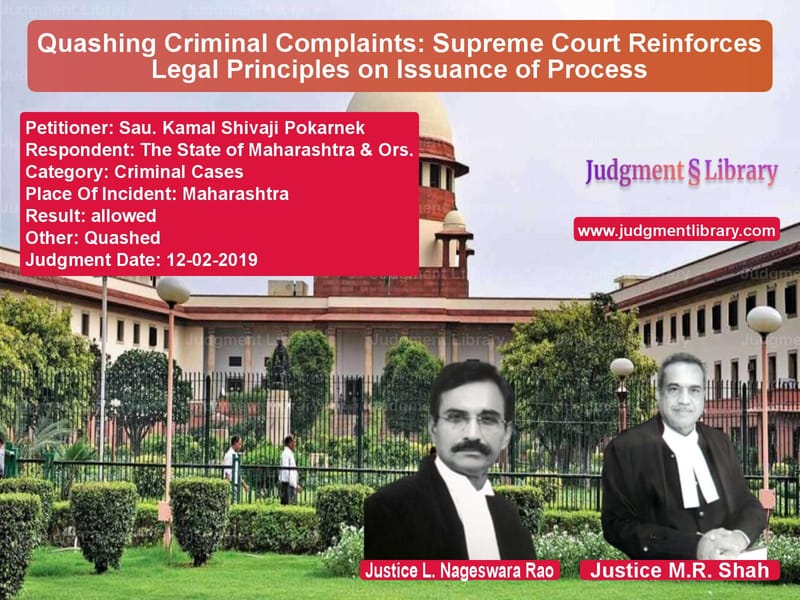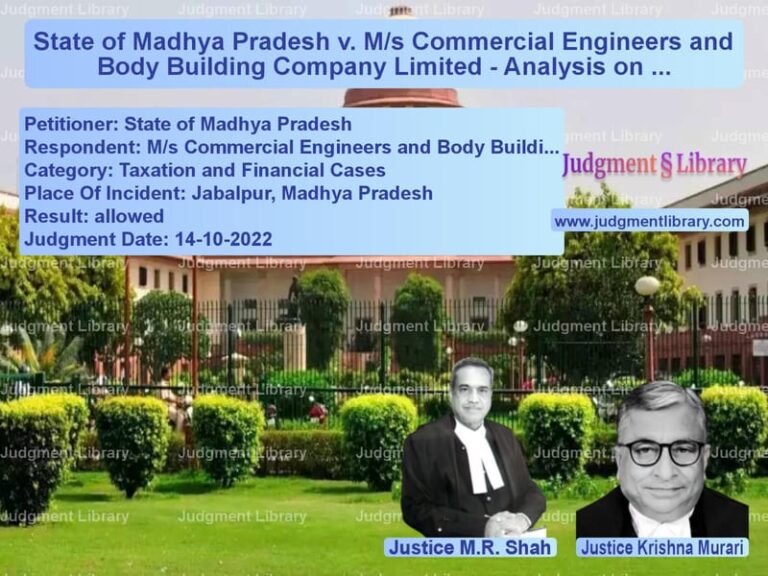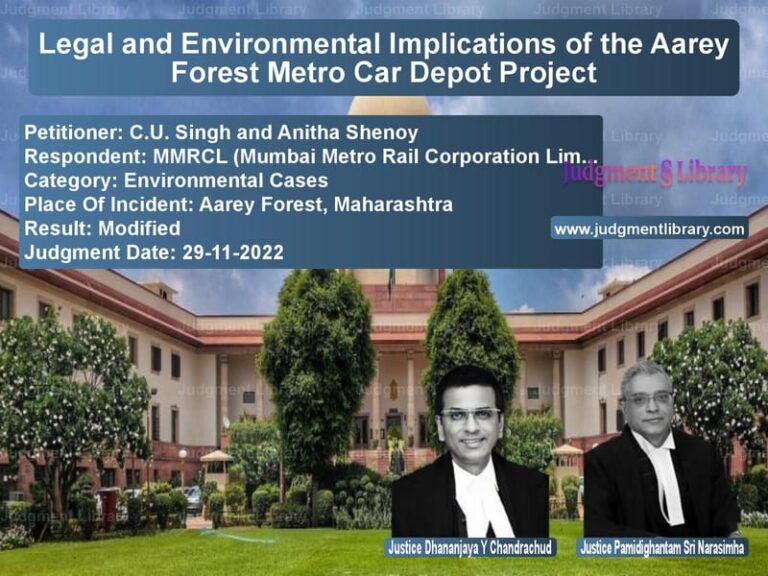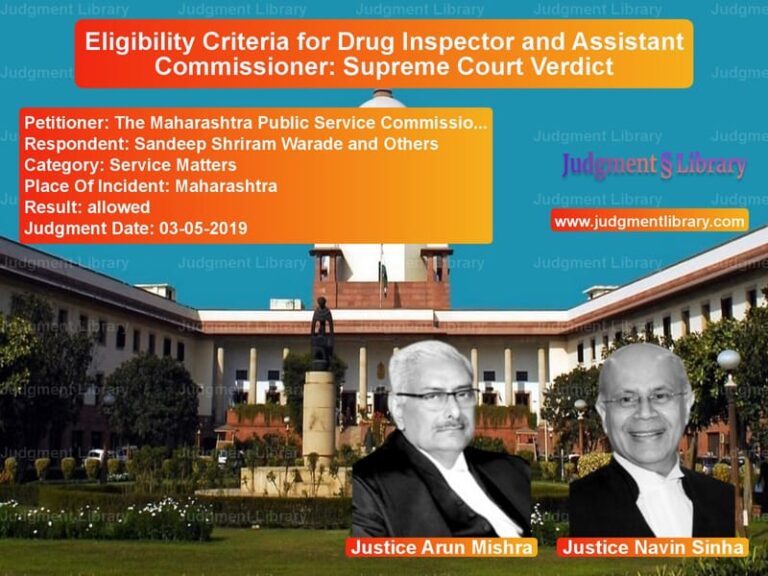Quashing Criminal Complaints: Supreme Court Reinforces Legal Principles on Issuance of Process
The case of Sau. Kamal Shivaji Pokarnek vs. The State of Maharashtra & Ors. deals with an important legal issue concerning the quashing of criminal complaints and the extent of the High Court’s power in interfering with the trial court’s decision to issue a process. The Supreme Court of India in this judgment clarifies that a complaint should not be quashed at the threshold unless it fails to disclose any offense or is evidently frivolous and vexatious. The ruling is a significant precedent in cases where criminal proceedings are challenged as an abuse of the legal process.
Background of the Case
The appellant, Sau. Kamal Shivaji Pokarnek, had filed a complaint alleging that the respondents had committed forgery and prepared false documents to create a development agreement dated 11.12.2002. The complaint accused the respondents of offenses under Sections 420, 465, 467, 468, and 471 read with Section 34 of the Indian Penal Code (IPC). The allegations revolved around the property of the complainant’s father, Shamrao Nalavade, who had passed away in 1994.
The trial court had issued process against the respondents after recording the statement of the complainant’s husband. However, when the respondents challenged this decision before the High Court, the process was quashed on the grounds that the dispute was of a civil nature and did not warrant criminal prosecution.
Petitioner’s Arguments
The appellant argued:
- The High Court exceeded its jurisdiction by quashing the order of the trial court summoning the accused.
- At the stage of issuing process, the trial court only needs to determine whether a prima facie case exists, not evaluate the merits of the allegations.
- The High Court erroneously concluded that the case was of a civil nature and ignored the elements of forgery and fraudulent documentation.
- The case should proceed to trial where the veracity of the claims could be tested based on evidence.
Respondent’s Arguments
The respondents contended:
- The complaint was frivolous and aimed at harassing them.
- The alleged document was not a sham, as the complainant’s father himself had testified about the transfer of possession during his lifetime.
- The dispute was purely of a civil nature and did not attract criminal liability.
- The High Court was justified in preventing the abuse of the criminal justice system by quashing the complaint.
Supreme Court’s Observations
The Supreme Court analyzed the scope of a magistrate’s power in issuing process and the conditions under which criminal complaints can be quashed. The Court emphasized:
“The Magistrate, at the stage of taking cognizance and summoning, is required to apply his judicial mind only with a view to taking cognizance of the offense, or in other words, to find out whether a prima facie case has been made out for summoning the accused persons. The learned Magistrate is not required to evaluate the merits of the material or evidence in support of the complaint, because the Magistrate must not undertake the exercise to find out whether the materials would lead to a conviction or not.”
The Court further elaborated:
“Quashing the criminal proceedings is called for only in a case where the complaint does not disclose any offense, or is frivolous, vexatious, or oppressive. If the allegations set out in the complaint do not constitute the offense of which cognizance has been taken by the Magistrate, it is open to the High Court to quash the same. However, it is not necessary that a meticulous analysis of the case should be done before the trial to find out whether the case would end in conviction or acquittal.”
Final Judgment
The Supreme Court ruled:
- The High Court erred in setting aside the order of the trial court issuing process against the respondents.
- A perusal of the complaint disclosed prima facie offenses, which needed to be examined during the trial.
- At the initial stage of issuance of process, courts should not stifle proceedings by delving into the merits of the case.
- Criminal complaints cannot be quashed solely on the ground that they appear to be of a civil nature if the allegations meet the ingredients of a criminal offense.
Accordingly, the Supreme Court allowed the appeal and restored the trial court’s order summoning the accused.
Conclusion
This judgment reinforces that High Courts should exercise caution before interfering with the trial court’s decision to issue process. The ruling underscores that criminal proceedings should not be prematurely quashed when a prima facie case is established, ensuring that due process of law is followed.
Petitioner Name: Sau. Kamal Shivaji Pokarnek.Respondent Name: The State of Maharashtra & Ors..Judgment By: Justice L. Nageswara Rao, Justice M.R. Shah.Place Of Incident: Maharashtra.Judgment Date: 12-02-2019.
Don’t miss out on the full details! Download the complete judgment in PDF format below and gain valuable insights instantly!
Download Judgment: Sau. Kamal Shivaji P vs The State of Maharas Supreme Court of India Judgment Dated 12-02-2019.pdf
Direct Downlaod Judgment: Direct downlaod this Judgment
See all petitions in Fraud and Forgery
See all petitions in Attempt to Murder Cases
See all petitions in Judgment by L. Nageswara Rao
See all petitions in Judgment by Mukeshkumar Rasikbhai Shah
See all petitions in allowed
See all petitions in Quashed
See all petitions in supreme court of India judgments February 2019
See all petitions in 2019 judgments
See all posts in Criminal Cases Category
See all allowed petitions in Criminal Cases Category
See all Dismissed petitions in Criminal Cases Category
See all partially allowed petitions in Criminal Cases Category







